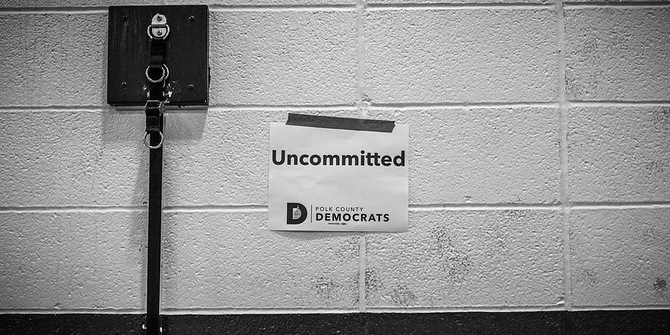 The Iowa Caucus usually marks the beginning of a presidential election season, and often sets the tone for the rest of the race. This year, the Democratic Party’s Iowa Caucuses were marred by technical difficulties with a vote counting app which severely delayed the results. Peter Finn gives five key takeaways from the caucus chaos.
The Iowa Caucus usually marks the beginning of a presidential election season, and often sets the tone for the rest of the race. This year, the Democratic Party’s Iowa Caucuses were marred by technical difficulties with a vote counting app which severely delayed the results. Peter Finn gives five key takeaways from the caucus chaos.
- This article is part of our Primary Primers series curated by Rob Ledger (Frankfurt Goethe University) and Peter Finn (Kingston University). Ahead of the 2020 election, this series explores key themes, ideas, concepts, procedures and events that shape, affect and define the US presidential primary process. If you are interested in contributing to the series contact Rob Ledger (ledger@em.uni-frankfurt.de) or Peter Finn (p.finn@kingston.ac.uk).
Though the full repercussions of the delay in the release of the Iowa caucus results will take longer to become clear, some takeaways already seem to be shaping the narrative regardless of when the results are actually released
1. Is this the end of the Iowa Primary?
Iowa is a tiny state (in population terms it’s less than one percent of the US total) that is responsible for a very small fraction of delegates that will formally feed into the process that selects the Democratic nominee to go up against President Trump in November. There had already been murmurings of discontent from numerous campaigns heading into the Iowa Caucus about its outsize role. Whatever the reasons, the bumbling of the last 24-hours are only likely to make calls for reducing this role louder.
2. Why the focus on cyber intrusion?
For a casual observer of US politics, one of the stranger aspects of the last 24-hours might be the slightly off-kilter denials from the Iowa Democratic Party that the delay in publishing result is not related to any kind of ‘cyber security intrusion’. One of the biggest controversies of the last four years has been Russian attempts to disrupt the 2016 US presidential election, as documented by the Mueller Investigation. Given that the disparities in the count in Iowa appear to relate, at least in part, to the app that precincts were meant to use to transmit results to the Iowan Democratic Party, the denials appear to be an attempt to quash any rumours of such disruption in this election.

“Des Moines Precinct 61” by Phil Roeder is licensed under CC BY 2.0
3. The New Hampshire Primary just became much more important
Regardless of when (or if?) the results from Iowa eventually come out, the New Hampshire Primary, which takes place next Tuesday (February 11th), has become much more important to the race to become the Democratic Party nominee. Like Iowa, it is responsible for a very small fraction of Democratic Party delegates. However, unlike Iowa, New Hampshire runs a primary (essentially a ballot) rather than the much more complex caucus run by Iowa. If the New Hampshire primary goes smoothly, it may be much harder for Iowa (and other states such as Nevada and Wyoming) to maintain the use of caucuses in future.
4. Democrats have ceded the narrative to Trump
Given the news vacuum that the delay in releasing results has caused, the Democratic Party has, via flaws in its own technology and processes, ceded the media narrative to Trump. Indeed, on Tuesday Trump had already started to taunt democrats by asking Democrats if they were going to start blaming ‘RUSSIA RUSSIA RUSSIA’ for the debacle?
5. Democrats will need to act quickly to restore confidence
Following the 2018 midterms, the Democrats had a relatively positive electoral narrative. Up until today, for their supporters at least, they could supplement this with the recent impeachment of Trump. However, the confidence that has taken three years to build up will shaken by the bumbling in Iowa. If they are to mount a credible challenge to Trump in November, restoring confidence in their ability administer upcoming primary contests successfully will be key.
Please read our comments policy before commenting.
Note: This article gives the views of the author, and not the position of USApp– American Politics and Policy, nor of the London School of Economics.
Shortened URL for this post: http://bit.ly/2GSgUwe
About the author
 Peter Finn – Kingston University
Peter Finn – Kingston University
Dr Peter Finn is a multi-award-winning Senior Lecturer in Politics at Kingston University. His research is focused on conceptualising the ways that the US and the UK attempt to embed impunity for violations of international law into their national security operations. He is also interested in US politics more generally, with a particular focus on presidential power and elections. He has, among other places, been featured in The Guardian, The Conversation, Open Democracy and Critical Military Studies.






